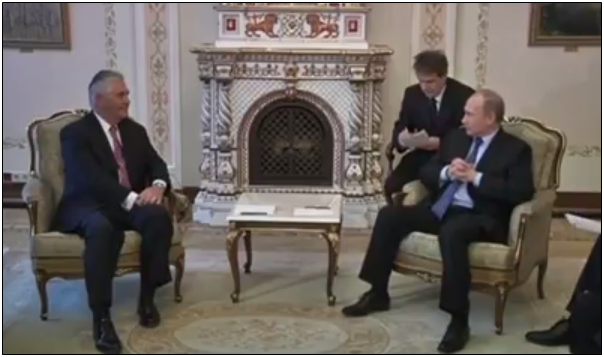The ink on President-elect Donald Trump’s selection Exxon-Mobil CEO Rex Tillerson to be the next Secretary of State had barely dried and the new Red Scare was in a full-throated wail, declaring Tillerson to be an enemy of the state and, yes, a puppet of none other than Russia and Vladimir Putin.
“Rex Tillerson: an appointment that confirms Putin’s U.S. election win,” reads one headline from the Guardian.
“Behind the deep ties between Exxon’s Rex Tillerson and Russia,” reads another from CNN Money.
“Trump picks Putin’s friend for State Secretary,” warns Ukraine Today.
The evidence? Exxon-Mobil does business in Russia, Tillerson got the Order of Friendship award from Russia in 2013, and Tillerson even met with Putin. Oh, and he was skeptical of sanctions against Russia over Crimea, saying in 2014 at the Exxon-Mobil annual meeting: “We do not support sanctions, generally, because we don’t find them to be effective unless they are very well implemented comprehensibly, and that’s a very hard thing to do. So, we always encourage the people who are making those decisions to consider the very broad collateral damage of who are they really harming.”
Never mind the fact that Exxon-Mobil does business in almost every country in the world. And that Exxon-Mobil’s relationship with Russia predates Tillerson’s tenure as the company’s CEO.
Or that former Canadian Prime Minister Jean Chrétien received that same award in 2014.
Or that even Hillary Clinton, a Putin critic, met with Putin, something it turned out she bragged about later.
Or that even with sanctions against Russia in place, yes, that does prevent Exxon-Mobil from pursuing certain projects, but in other areas it is still allowed to do business in Russia. There is no allegation Exxon-Mobil violated the sanctions on Tillerson’s watch.
None of this is evidence of espionage. It shows simply that Tillerson as CEO of Exxon-Mobil stood up for Exxon-Mobil’s global interests.
It also indicates that through the choice of Tillerson, Trump could be signaling he still wants to repair relations with Russia after a disastrous 8 years by the Obama administration over Syria and Ukraine. It is something he campaigned on — and it makes a lot of sense.
Isn’t deescalating tensions between the two top nuclear superpowers in the world supposed to be a good thing, to everyone’s benefit? Who wants war with Russia? Tillerson’s insight could be key to putting together that policy, making him an asset to the Trump administration. If nothing else, with his election win, Trump has earned his chance to implement the foreign policy he campaigned on.
Still, some members of the Senate are expressing reservations. Senator Marco Rubio (R-Fla.) has said he has “serious concerns” with Tillerson. Rubio tweeted, “Being a ‘friend of Vladimir’ is not an attribute I am hoping for from a #SecretaryOfState.”
However, the nation’s top diplomat having a history of diplomacy is usually considered a qualification, not evidence of espionage — which by the way is a really serious charge. What is Rubio implying?
When Whittaker Chambers accused former State Department official Alger Hiss of being a Soviet spy in 1948, he actually had evidence. Specifically, microfilm copies of classified State Department documents he said Hiss had given to him to pass along to the Soviets. Those documents later became the basis of a successful perjury charge against Hiss.
When the Rosenbergs were accused and then convicted in 1951 of handing nuclear secrets to the Soviets, and executed, there was evidence including witnesses.
Later when the decoded Soviet cables were declassified, a project known as Venona, they showed that indeed Hiss, the Rosenbergs and other prominent government officials were in fact Soviet spies. Guilty as charged.
In the 1940s and 1950s, there were legitimate fears that the Soviet Union had penetrated the U.S. government. It was a terrible time in American history, but that the Soviet espionage had happened was undeniable. And when there was clear evidence of espionage, the federal government brought real charges, led prosecutions and presented its findings in courts of law.
None of that is in question here with Tillerson or Trump for that matter. All of that should advise an abundance of caution in leveling such charges. Members of the Senate like Rubio might not agree with Trump’s stated policies toward Russia — these questions came up in the Republican primary, too, brought up by Rubio, and Trump responded, “wouldn’t it be nice if actually we could get along with Russia, we could get along with foreign countries,” and Rubio lost — but that will not be the question before that body. Will Tillerson be an effective messenger for Trump’s America first foreign policy? Is he qualified?
On those counts, Tillerson passes in spades. He and Trump appear to see eye-to-eye on key issues facing the U.S. on the world’s stage, and he has conducted deals worth billions of dollars all over the world and his rolodex might fill a few file cabinets. Former Secretaries of State Condoleezza Rice and James Baker have both vouched for Tillerson.
If there is one benefit to the Russia question coming up over Tillerson, it will be to put this new Red Scare nonsense to bed once and for all when he is confirmed easily as the nation’s next Secretary of State.
Robert Romano is the senior editor of Americans for Limited Government.








